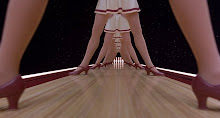A totally unsurprising new study has found that the more young people felt they had to look attractive in order to be accepted by their peers they were, wait for it, more sensitive to being rejected on the basis of their appearance Also found was that this effect was stronger for women than men. Wow. More interesting was that the study also found that there was no relationship between the degree that these young peoples parents were concerned about their appearance and the participants sensitivity to being rejected on the basis of their appearance. However the final and again unsurprising result does strike me as important, that of the role of the media.
It’s pervasive and almost unavoidable, in the city even if you don’t own a telly it’s hard not to notice big billboards or tram ads. Well, sadly and predictably this study found that greater internalisation of media based ideals of attractiveness predicted greater appearance based rejection sensitivity* in both sexes. That is, the more these people identified beauty with that presented in the media, the more likely they were to anxiously expect and overact to signs of rejection based on their appearance. This point is key, as it is the internalisation of these ideal of beauty that causes grief for all of us not just these 220 students in Buffalo, NY, USA.

Evolutionary psychology suggests that indicators of beauty, such as symmetry are also likely indicators of good health, thus we find these indicators pleasant and attractive. So to some extent the link between attractiveness and acceptance is a given and may be beneficial to us. However the ability of today’s media (and us) to easily search for and present beauty means our ‘peer group’ likely includes the drop-dead gorgeous whom we’ll never meet. As these evolutionarily powerful images are easily recalled, when we compare ourselves we face some strong competition and not even the example, good or otherwise, set by our parents will affect this.
What I want know however, is the relationship between internalising the media ideals and media consumption. Is it the acceptance of these ideals that results in this internalisation or is the amount, the volume and frequency, of beauty seen also a factor in internalising these ideals irrespective of a critical attitude? Can we inoculate ourselves?
Because it’s very hard to avoid.
...
Lora E. Park, Ann Marie DiRaddo, Rachel M. Calogero. Sociocultural Influence And Appearance-based Rejection Sensitivity Among College Students. Psychology of Women Quarterly; 33 (1)
From sciencedaily
*humorously this was shortened to Appearance-RS, i guess writing ARS all the time might have diminished the overall tone of the paper.
It’s pervasive and almost unavoidable, in the city even if you don’t own a telly it’s hard not to notice big billboards or tram ads. Well, sadly and predictably this study found that greater internalisation of media based ideals of attractiveness predicted greater appearance based rejection sensitivity* in both sexes. That is, the more these people identified beauty with that presented in the media, the more likely they were to anxiously expect and overact to signs of rejection based on their appearance. This point is key, as it is the internalisation of these ideal of beauty that causes grief for all of us not just these 220 students in Buffalo, NY, USA.

Evolutionary psychology suggests that indicators of beauty, such as symmetry are also likely indicators of good health, thus we find these indicators pleasant and attractive. So to some extent the link between attractiveness and acceptance is a given and may be beneficial to us. However the ability of today’s media (and us) to easily search for and present beauty means our ‘peer group’ likely includes the drop-dead gorgeous whom we’ll never meet. As these evolutionarily powerful images are easily recalled, when we compare ourselves we face some strong competition and not even the example, good or otherwise, set by our parents will affect this.
What I want know however, is the relationship between internalising the media ideals and media consumption. Is it the acceptance of these ideals that results in this internalisation or is the amount, the volume and frequency, of beauty seen also a factor in internalising these ideals irrespective of a critical attitude? Can we inoculate ourselves?
Because it’s very hard to avoid.
...
Lora E. Park, Ann Marie DiRaddo, Rachel M. Calogero. Sociocultural Influence And Appearance-based Rejection Sensitivity Among College Students. Psychology of Women Quarterly; 33 (1)
From sciencedaily
*humorously this was shortened to Appearance-RS, i guess writing ARS all the time might have diminished the overall tone of the paper.




0 comments:
Post a Comment